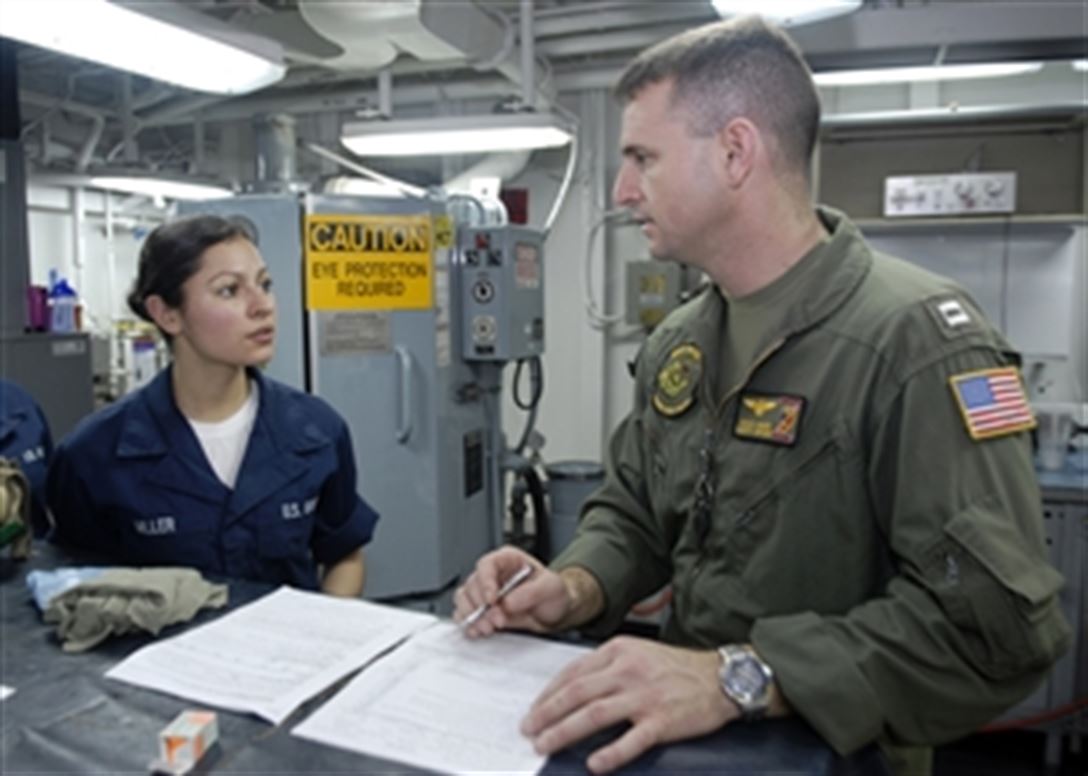
An officer gives positive feedback to an Airman as she completes a spot check aboard the amphibious assault ship USS Essex (LHD 2) in the Gulf of Thailand on Feb. 12, 2009. DoD Photo.
One problem that many veterans face in their post-military life is how to manage ambiguity. I’ve experienced it myself, and seen many other veterans struggle with it. It’s not that we always need the black and white answer, just that we’re not used to no answer. “Give it to me straight” is the request. let me know what’s going on so I can decide how I’m going to respond.
In my opinion, this is one of the central problems when it comes to employment searches. In the military, especially at the lower ranks, you were given immediate feedback about whether or not you “get the job.” In the Army, through the promotion board system, you don’t have to wait for a call weeks later (if at all) to see if you “aced the interview.” You are told within hours of it happening, if not minutes. When job searches…not so much. “We’ve decided not to move forward with your application at this time” might be the most feedback that you’re going to get.
This can an even greater challenge if there are other things involved, like a veteran working through some traumatic stress reaction. One study found that combat veterans who are diagnosed with PTSD are “significantly more adverse to ambiguity…but only when making choices associated with potentially negative outcomes” (see the full study here). This makes sense, of course, if a veteran is actively looking to avoid negative outcomes, which is a central component of posttraumatic stress.
There are some factors to consider when it comes to managing ambiguity in post-military life:
Feedback is a Significant Part of Military Service
For service members, feedback was an integral part of the experience. Formally or informally, we were routinely told how they were doing in general, or specifically on certain tasks. You were either a “go” at this station or a “no-go” at this station. You were never a “neither” and then left to figure it out on your own. Go” at this station? Move out, troop, and get the next thing done. “No-go”? Remedial training, do it again until you got it right. Effective training in the military was a “tell-show-do” process. Tell me what you need me to do (classroom portion). Show me what you need me to do (practical exercise). Have me do it until I get it right (evaluation). Every military school I ever attended, or training event that I was a part of, had these components to a greater or lesser degree.
This doesn’t happen in post military life. There might not even be much “telling,” there is rarely any “showing” and the “do” is expected. This takes some getting used to, and is part of adapting from a culture of feedback and reinforcement to one of ambiguity.
Being Uncomfortable Not Getting Feedback Is Not the Same Thing as Needing Feedback
Many veterans I know get frustrated by the lack of feedback they get. I know, because I experience it myself. Just because it makes us uncomfortable, however, doesn’t mean that we need it to survive. This is one of the “background programs” that we don’t realize is there until it’s gone. Sometimes, we don’t even realize it then. It’s something that we can adapt to, often because we will have to adapt to it. We’re simply not going to get the task-oriented feedback in post-military life that is the same as we got while we were in.
Just because we want it, though, doesn’t mean we need it. We don’t always need to be told what to do; service members are adaptable enough to manage their expectations. If we expect feedback, and don’t get it, then we get frustrated. If we manage our expectations, then we’re less likely to get frustrated. We can do that by anticipating ambiguity.
Veterans Can Learn to Give Themselves Their Own Feedback
For me personally, and veterans I work with, getting any type of feedback is better than none at all. If it’s a “yes,” I know what to do next. If it’s a “no,” I know what to do next. When it comes to just waiting, however, then I don’t have a third option. We can give ourselves that third option, however; in the absence of feedback, move forward with what we know. In the face of uncertainty, make a decision based on the most accurate data available. If the only data that you have is that you worked hard to prepare for something, did your homework, made every effort to be prepared…then rely on that knowledge and be satisfied with your effort.
Another way that a veteran can give themselves feedback is to find a trusted mentor. Someone who is invested in you and your personal and professional development. If it’s employment, or job performance, or whatever, finding someone who is willing to tell you that the emperor ain’t got no clothes is a way to know how you’re doing. If it’s a resume tweak or a technique that needs to be improved, then a mentor can help you make the adjustments. The mentor might come back and tell you that all looks well…then it’s the other party’s problem, not yours.
Understanding that feedback was a critical part of military service, and that it will not necessarily be so in post-military life, can reduce a lot of the frustration that we experience in life after the military.
Want to keep up with all of the Head Space and Timing content? Subscribe Here

The Head Space and Timing Blog is supported by the Colorado Veterans Health and Wellness Agency, a 501(c)3 Nonprofit in Colorado Springs, Colorado. The goal of the CVHWA is to provide military culturally competent mental health counseling to veterans and their spouses, regardless of characterization of discharge, time of service, or era of service. Our vision is to assist veterans to identify and remove barriers to their mental, physical, emotional, and behavioral wellness. For questions or inquiries, contact us!


